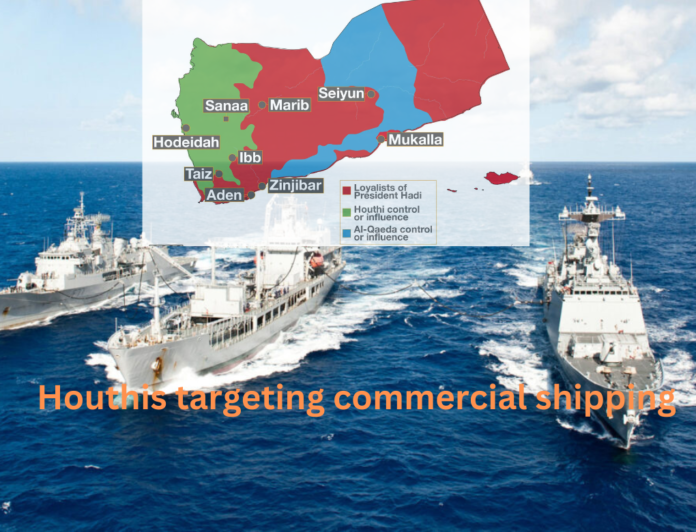Houthis have also jumped into the ongoing Israel Palestine conflict. In recent weeks, the Houthi faction from Yemen launched a series of ballistic missile and drone strikes on numerous commercial ships sailing through the Red Sea. This compelled the United States Navy vessels stationed in the area to take action.
This aggressive move was an extension of the Houthis’ blockade on shipping connected to Israel, specifically targeting routes passing through the Bab-el-Mandeb, the crucial strait linking the southern entrance to the Red Sea. The Houthis, entangled in Yemen’s prolonged civil conflict, have been engaged in nearly a decade-long battle against Saudi-led forces. Yemen has faced persistent turmoil throughout much of the 21st century.
Who are the Houthis?
The Houthi group, a Shia Islamist organization, originated in Yemen during the 1990s, primarily comprising Zaidi Shia of Houthi tribe.
Under the guidance of Zaidi religious figure Hussein al-Houthi, the Houthis emerged as a dissenting force against Yemeni President Ali Abdullah Saleh, whom they accused of corruption and alleged support from Saudi Arabia and the United States. Drawing inspiration from Lebanon’s Shia political and military entity, Hezbollah, in 2003, the Houthis adopted an official slogan opposing the United States, Israel, and the Jewish community. Al-Houthi’s death at the hands of the Yemeni military in Saada in 2004 sparked the Houthi insurgency, following his resistance to Saleh’s orders for his arrest. Since then, his brother Abdul-Malik al-Houthi has largely led the movement.
Why they are targeting commercial shipping?
According to intelligence reports, the majority of Houthi attacks have focused on Saudi-affiliated shipping, particularly since 2017. However, Israel has also felt significant impact from Houthi actions in the vicinity of the Bab-el-Mandeb. This led Tel Aviv to participate in joint naval exercises with the US and UAE after the Abraham Accords, a set of agreements facilitated by the US to normalize relations between Israel and the UAE, Bahrain, Morocco, and Sudan.
This recent shift highlights Israel as the primary target, aligning with the new aim of Houthi maritime warfare: increasing the global cost of the conflict in Gaza. This insight was detailed in a New York Times report following the initial Houthi strikes in the Red Sea. This strategic political focus distinguishes the Houthi attacks in the Red Sea from the activities of Somali pirates, who have primarily sought financial gain by seizing vessels. While the Houthis have also targeted economic assets, such as Saudi Aramco facilities in Riyadh and Jeddah, causing significant spikes in oil prices during 2021 and 2022, their targeting of commercial shipping seems to serve as a means rather than an ultimate goal.
While Saudi Arabia has been a front-line state in the civil war in Yemen, years of monetary and military investment without effective victory, fresh risks to its oil exports, as well as the Houthis’ ability to withstand a war of attrition, have pushed Riyadh to now extricate itself from the war. Hence, even as Riyadh repaired its fractured relationship with Tehran through a Beijing-facilitated rapprochement in March, it had all but closed in on a peace deal with the Houthis themselves, by December. The Saudis were betting on a new West Asia, pushing the envelope by considering normalised relations even with Israel before October 7.
Hence, the lingering momentum of the Abraham Accords resulted in a new Arab modus vivendi. Their reaction to Israel’s Gaza campaign has been critical but restrained. On the other hand, the alarming civilian death toll in Gaza and growing Arab public opinion against Israel has meant that these states have indicated little willingness to join US-led coalitions seeking to punish anti-Israel actors (save Bahrain, no Arab state has thus far joined Washington’s Operation Prosperity Guardian in the Red Sea).
Situate this against Riyadh’s unwillingness to abandon its rapprochement with Iran despite Tehran’s hostile rhetoric against Israel and the US, and there is abundant evidence to show that as the Houthis step up attacks against Israeli and American targets in the Red Sea, Saudi Arabia may only stand by.
Houthis are displaying their willingness to do what Arab states cannot —and respond militarily to Israeli aggression in Gaza, through a low-cost, high-value maritime campaign. They are helped in considerable part by the ongoing twin detente (Saudi-Houthi, Saudi-Iran). Arab states, in return, shall express concern and offer criticism (given the adverse effects on their own shipping), but shall not join military action against the Houthis, as the effect of the group’s campaign ultimately bolsters pressure on Israel to end the war.
What is India’s position?
India doesn’t want to openly appear against Houthis as this may hamper its economic interest severely though two India-linked vessels, MV Chem Pluto and MV Sai Baba, were targeted by drone strikes in December 2023. Moreover a favourable stand towards Palestine puts India in a difficult situation. India would like to push for the ceasefire in the area as early as possible.


